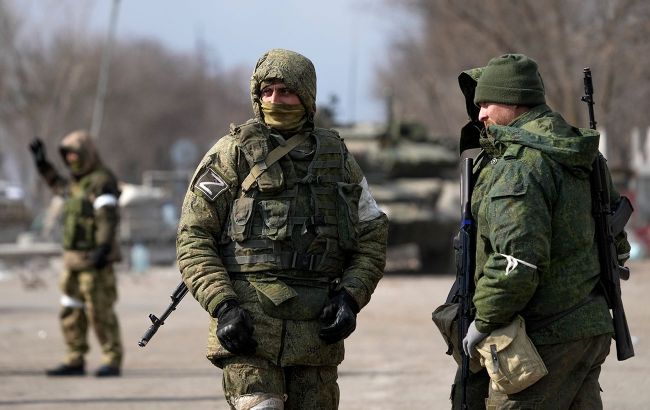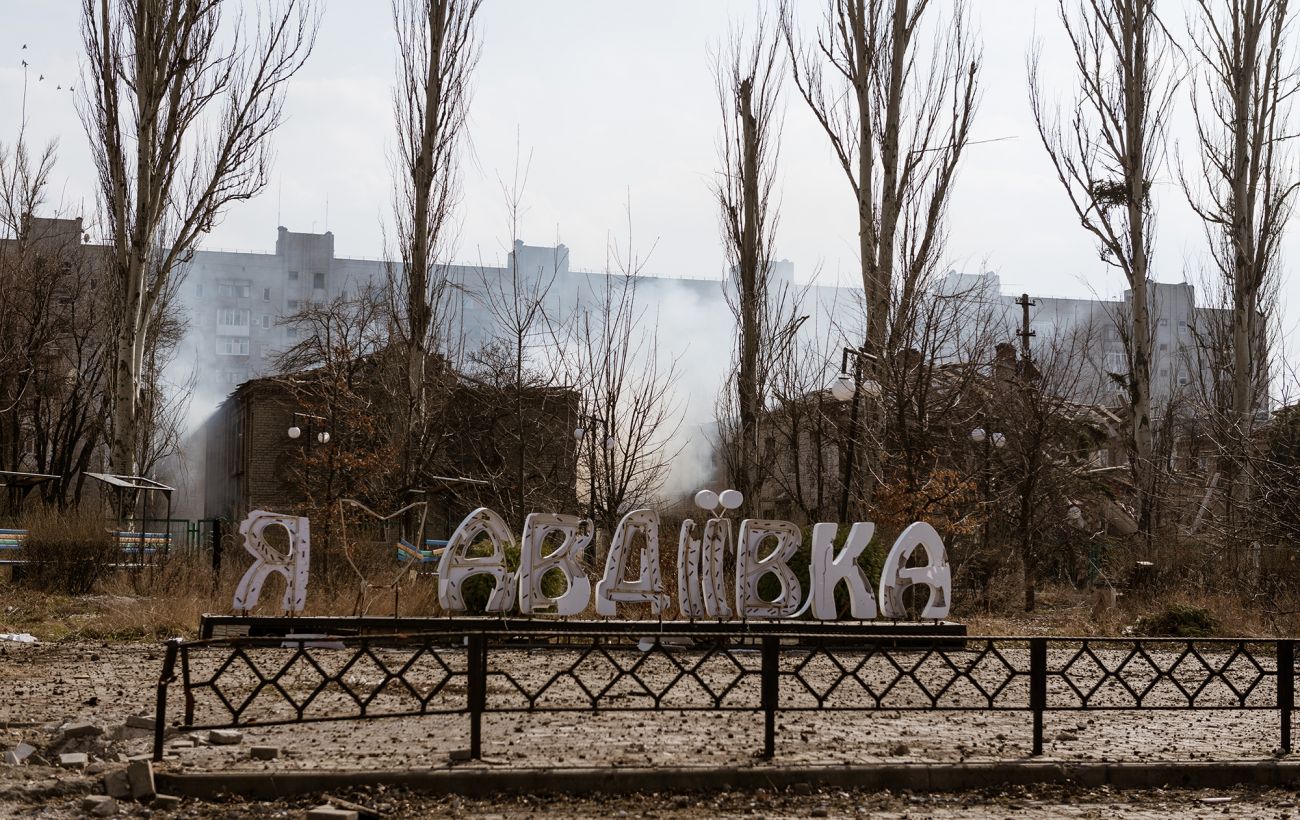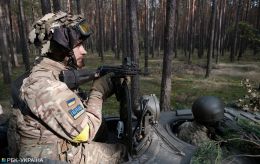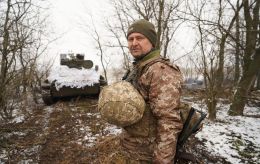Russian military intensifies executions of Ukrainian POWs: Who is accountable for genocide
 Photo: Russian soldiers demonstratively shoot Ukrainian soldiers at the front (Getty Images)
Photo: Russian soldiers demonstratively shoot Ukrainian soldiers at the front (Getty Images)
Lately, there have been more frequent executions of captured Ukrainian soldiers on the front line, who fell into Russian captivity. Corresponding videos are circulating online, while law enforcement agencies are initiating criminal cases, and Ukraine is seeking international assistance.
Sources: statements of the Ukrainian Parliament Commissioner for Human Rights Dmytro Lubynets, Facebook account of the 110th Separate Mechanized Brigade named after Corporal General Marko Bezruchko, Radio Liberty interview with Yuriy Bielousov, Head of the Department for Combating Crimes Committed during the Armed Conflict at the Office of the Prosecutor General, comments by experts Oleksandr Musiienko and Oleksandr Kovalenko.
Contents
- Incidents in Donbas and Zaporizhzhia region
- Anger, cynicism, and genocide. Why Russians execute prisoners
- Criminal cases and requests for assistance. How Ukraine reacts
Incidents in Donbas and Zaporizhzhia region
Over the past weekend, a video appeared online showing the execution of Ukrainian soldiers who surrendered as prisoners of war. Drone footage captured a group of occupiers shooting unarmed soldiers, some with their hands raised in surrender.
According to Dmytro Lubinets, Ukrainian Parliament Commissioner for Human Rights, it happened on February 24 in the Bakhmut district of the Donetsk region.
"The video we obtained shows Ukrainian soldiers surrendering: their hands were raised, indicating they were unarmed and posed no threat. Instead of taking them as prisoners, the Russians ruthlessly executed them," he said
Lubinets also adds that the exact number of casualties is unknown, but likely no fewer than seven. He says that the Ukrainian side knows which military unit the war criminals belong to. According to the Ukrainian DeepState project, there may have been not seven, but nine victims.
Prosecutors stated that the Russians had executed Ukrainians during the assault on positions between the villages of Ivanivske and Khromove. Ukrainian defenders were ordered out of their trench, gathered in one place, and then shot with automatic gunfire. The announcement stated that representatives of the aggressor country deliberately killed wounded and unarmed soldiers, disregarding international law.
Unfortunately, this incident is not isolated as several such cases were recorded in February alone. Before the incident near Bakhmut on February 18, occupiers executed three prisoners of war near the village of Robotyne in the Zaporizhzhia region. Subsequently, a video of the execution of two fighters appeared online after the assault in the area of the village of Vesele (Bakhmut district). According to prosecutors, they were shot at close range with automatic weapons.
On February 18, the DeepState reported the killing of six defenders of Avdiivka at the Zenit positions. It was even more cynical that they were wounded and awaiting evacuation. As stated by the 110th Separate Mechanized Brigade named after Corporal General Marko Bezruchko, the withdrawal from the position took place amidst continuous artillery, aviation, and FPV drone strikes, including on evacuation routes.

Photo: One of the mass executions took place at the Zenit position in Avdiivka (Getty Images)
Because of the rapid advance of the Russians, the Zenit stronghold was surrounded, so it was decided to contact the coordination center and organizations negotiating prisoner exchanges. As a result, it was agreed to assist wounded soldiers.
"The enemy informed the coordinators of this process that they agreed to evacuate our wounded and provide them with assistance, and then exchange them. Our servicemen were ordered to preserve their lives. What happened next, we learned from enemy sources," the brigade added, naming five of the six deceased.
According to Lubinets, the dialogue with the enemy proceeded following international laws and rules protecting prisoners of war.
"We had the opportunity to communicate with the Russian side. We had previously agreed that wounded Ukrainian soldiers would be officially taken prisoner, assisted, and then returned through the exchange procedure. Unfortunately, the Russian side once again demonstrated that any agreements may not be fulfilled," he said.
He also notes that Ukraine constantly faces violations of agreements, adding: "We don't know what to do about that."
In early February, a tragedy happened near Klishchiivka near Bakhmut. According to prosecutors, there is a video showing the commander of one of the RF units orders not to take prisoners. Subsequently, one unarmed soldier with raised hands was shot, and another had a grenade thrown into the trench.
Anger, cynicism, and genocide. Why Russians execute prisoners
The answer to why occupiers pretend to take Ukrainian soldiers as prisoners of war only to later execute them boils down to a simple fact - Russia does not abide by laws and rules, emphasizes Lubinets.
"Not wishing to leave prisoners alive, occupiers deliberately kill Ukrainian defenders... This is a serious international crime for which there will be severe punishment," he wrote.
Oleksandr Musiienko, Head of the Сenter of Military Law Researches, says such incidents have happened before. But they have become more frequent now because Russians are not achieving their goals on the battlefield to the fullest extent.
"One should understand that our enemy is extremely cynical and cruel. They are very angry about their losses and try to vent this aggression on Ukrainian soldiers, including prisoners. Therefore, such cases have indeed become more frequent compared to the past period, but they have occurred before," he told RBC-Ukraine.
The increase in the number of executions of Ukrainians who surrender as prisoners has been recorded since last fall.
"We see a trend of increasing such cases, starting from the end of November 2023. This year it's just becoming commonplace. It's mainly the Zaporizhzhia region, Donetsk region," says Yuriy Bielousov, the head of the relevant department of the Prosecutor General's Office.
 Photo: Prosecutor Yuriy Bielousov calls the executions of Ukrainian prisoners part of the Russian plan for genocide (Vitalii Nosach / RBC-Ukraine)
Photo: Prosecutor Yuriy Bielousov calls the executions of Ukrainian prisoners part of the Russian plan for genocide (Vitalii Nosach / RBC-Ukraine)
He sees the spreading of videos on social networks as part of Russia's policy of subduing Ukraine and attempting to weaken military resistance.
"It means that it is part of the overall Russian plan for genocide and the destruction of the Ukrainian people. Therefore, the higher leadership - both military and political - cannot be unaware of such cases," he added.
According to a military and political expert of the Information Resistance Group Oleksandr Kovalenko, Russians are currently acting especially demonstratively.
"To intimidate our soldiers in positions. Because they (Russians) are not advancing as quickly as they would like, they are not achieving the victories they want, so they use moral and psychological pressure to somehow dominate over Ukrainian soldiers," he said in an interview with RBC-Ukraine.
Musiienko adds that the demonstration of anger and aggression is aimed at demoralizing the Ukrainian Defense Forces. Thus, the enemy is trying to provoke an increase in the number of defectors, people who refuse to follow combat orders.
On the other hand, the frequency of such incidents is influenced by the nature of combat operations. In many areas, Russians storm positions with infantry, approaching our trenches and positions closely. It increases the likelihood of falling into captivity with negative results.
"Unfortunately, even our soldiers who are forced to surrender are not spared. Therefore, undoubtedly, where active close combat is taking place, there are more such opportunities," he explained.
Moreover, the task of filling the exchange fund seems far from being a priority for the Russians.
"They seem to have a large exchange fund already. At least not small," added the expert.
Criminal cases and requests for assistance. How Ukraine reacts
These cases fall under the jurisdiction of Ukraine's domestic laws. Law enforcement agencies initiate criminal cases under Part 2 of Article 438 of the Criminal Code - violations of the laws and customs of war associated with intentional killing.
This article specifies that cruel treatment of prisoners of war or civilians, forced labor for civilians, looting of national treasures in occupied territories, the use of prohibited methods of warfare, and orders for such actions are punishable by imprisonment for 8 to 12 years. The second part - if all of the above is associated with intentional killing - carries a sentence of 10 to 15 years or life imprisonment.
Since the beginning of the full-scale invasion, 19 criminal cases have been opened for the murder of 45 prisoners. Prosecutor Yuriy Bielousov specifies that these are known cases, but there are many more. Executions have been documented since the early days of the war, particularly in the Chernihiv and Kharkiv regions. When considering cases, information is used not only from Russian videos. Investigators work with released prisoners who may be witnesses and also receive data from sources in Russia.
"We have identified specific people in some of these cases... There is testimony from Russian military personnel... We have verdicts in cases such as those in Chernihiv - there is already a court verdict against a Russian army major to life imprisonment, who executed a prisoner of war in March 2022," he said.
Following recent cases, investigations are ongoing to gather evidence. New suspicions will be announced soon. Ukraine shares information with partners, with the International Criminal Court, and tries to involve as many resources and countries as possible to show what is happening, Bielousov added.
 Photo: Ombudsman Dmytro Lubinets seeks a reaction from the UN and the Red Cross, but they systematically ignore the facts of war crimes (Vitalii Nosach/RBC-Ukraine)
Photo: Ombudsman Dmytro Lubinets seeks a reaction from the UN and the Red Cross, but they systematically ignore the facts of war crimes (Vitalii Nosach/RBC-Ukraine)
Prosecutor General Andriy Kostin, in an interview with Reuters, reported that over 122,000 war crimes Russian occupiers could commit are being investigated in total. More than 500 criminals have been identified while 80 verdicts have been handed down. Because of Moscow's sense of impunity, the number will continue to rise. Therefore, international assistance is needed in documenting, investigating, and prosecuting the guilty.
To document cases, Ukraine involves the UN Human Rights Monitoring Mission and appeals to the International Committee of the Red Cross, which is endowed with the relevant mandates. The Ukrainian side appeals to the violation of humanitarian law and the Geneva Conventions, but these facts are systematically ignored both by the UN and the Red Cross.
"Again, we report on war crimes, and again - no reaction," Ombudsman Dmytro Lubinets said in December.
Last week, he also sent urgent letters demanding the recording of war crimes and clarification of the circumstances of the shootings. Expert Oleksandr Kovalenko doubts this will yield the necessary result.
"The Red Cross is generally one of the first organizations to demonstrate its worthlessness and spinelessness," he told RBC-Ukraine.
The Convention Relative to the Treatment of Prisoners of War (one of the four treaties covering the Geneva Conventions) stipulates that parties to the conflict are obliged under all circumstances to treat persons who have laid down their arms or ceased to participate in hostilities due to injury or any other cause humanely. Violence, torture, all forms of murder, mutilation, etc. are prohibited against them.
In fact, from the moment a person raises their hands and surrenders, they can be considered a prisoner of war and be protected by the Convention. The document operates under the auspices of the Red Cross, and in 1993 the UN Security Council included it in customary international law, making it mandatory not only for signatories but also for other countries involved in conflicts.
***
According to Prosecutor Bielousov, Russian commanders on the ground not only do not prevent the practice of shooting prisoners but support it and most likely give direct orders. Experts polled by RBC-Ukraine believe it is impossible to influence Russians in this regard.
"They will act as they do. That's their nature," says Oleksandr Musiienko.
In his opinion, Ukraine needs a technological breakthrough not only to break the situation on the front lines but also to reduce the presence of military personnel in firing positions. Perhaps this will at least partially help avoid close combat.
"In other words, where it will not be necessary to keep a large number of our units in firing positions, these positions can be controlled by drones or robotic ground systems, and the military can work remotely. This could be a way to reduce the likelihood of being taken prisoner," the expert added.

